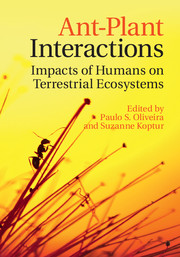
-
Select format
-
- Publisher:
- Cambridge University Press
- Publication date:
- 01 September 2017
- 17 August 2017
- ISBN:
- 9781316671825
- 9781107159754
- Dimensions:
- (247 x 174 mm)
- Weight & Pages:
- 1.06kg, 452 Pages
- Dimensions:
- Weight & Pages:
- Subjects:
- Life Sciences, Ecology and Conservation, Entomology
You may already have access via personal or institutional login- Subjects:
- Life Sciences, Ecology and Conservation, Entomology
Book description
Ants are probably the most dominant insect family on earth, and flowering plants have been the dominant plant group on land for more than 100 million years. In recent decades, human activities have degraded natural environments with unparalleled speed and scale, making it increasingly apparent that interspecific interactions vary not only under different ecological conditions and across habitats, but also according to anthropogenic global change. This is the first volume entirely devoted to the anthropogenic effects on the interactions between these two major components of terrestrial ecosystems. A first-rate team of contributors report their research from a variety of temperate and tropical ecosystems worldwide, including South, Central and North America, Africa, Japan, Polynesia, Indonesia and Australia. It provides an in-depth summary of the current understanding for researchers already acquainted with insect-plant interactions, yet is written at a level to offer a window into the ecology of ant-plant interactions for the mostly uninitiated international scientific community.
Reviews
'Ant-Plant Interactions is the definitive and greatly needed treatise on a subject of importance to general terrestrial ecology and the study of Earth’s dominant social insects.'
Edward O. Wilson - Harvard University, Massachusetts
'Ants dominate terrestrial habitats worldwide, and their interactions with plants structure biodiversity within those habitats. This edited volume offers a timely, comprehensive treatment of ways in which ecologically diverse ant-plant interactions are affected by, and are responding to, human-induced changes to the landscape. Worldwide in scope and covering topics that cut across basic ecology, agriculture, and conservation, it authoritatively reviews, presents new data, and highlights critical gaps in our nascent understanding of ants’ critical roles in terrestrial ecosystems.'
Judith L. Bronstein - University of Arizona
'Ants are intrinsically fascinating, so are plants, and their interactions result in evolutionary gymnastics we can hardly conceive of, consequently producing absorbingly wonderful creations. Their study continues to reveal more associational intricacies, as this book documents convincingly. The interrelationships among the most common animals on earth and the swath of green plants covering most of the Earth’s land surface contribute significantly to biodiversity and the resilience, maintenance, conservation and stability of ecosystems. Ants provide a wide variety of services in ecosystems: regulatory, provisioning, supporting, and cultural, with a much wider impact than commonly perceived - all with relevance to the welfare of humanity. Basic and applied interests in the topic are broadly represented by a stellar list of internationally recognized authors covering a diversified geographic range.'
Peter W. Price - Northern Arizona University
'In summary, because it treats situations from temperate climate regions in addition to the tropics, this volume covers cases that will interest a wide range of readers.'
Alain Dejean Source: The Quarterly Review of Biology
Contents
Metrics
Altmetric attention score
Full text views
Full text views help Loading metrics...
Loading metrics...
* Views captured on Cambridge Core between #date#. This data will be updated every 24 hours.
Usage data cannot currently be displayed.
Accessibility standard: Unknown
Why this information is here
This section outlines the accessibility features of this content - including support for screen readers, full keyboard navigation and high-contrast display options. This may not be relevant for you.
Accessibility Information
Accessibility compliance for the PDF of this book is currently unknown and may be updated in the future.


